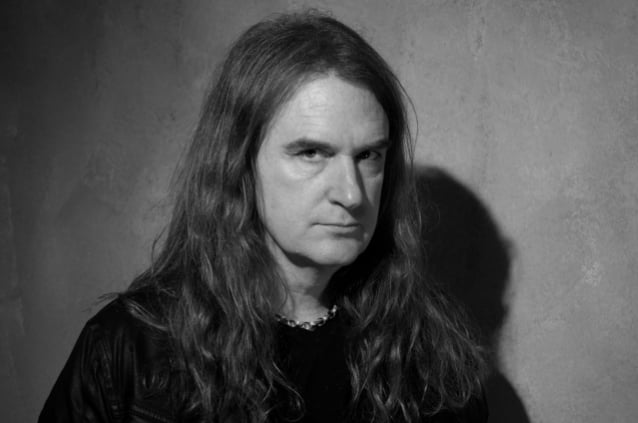
MEGADETH's 30-Years-Sober Bassist DAVID ELLEFSON Isn't Tempted By Alcohol On The Road
November 27, 2020MEGADETH bassist David Ellefson, who celebrated the 30th anniversary of his getting sober in March, was asked in a new interview with "The Chuck Shute Podcast" how he avoids the temptation of alcohol while spending so much time around people who drink on the road.
"I'm the alcoholic," Ellefson explained (see video below). "I'm the one that reacts strangely to alcohol and cocaine and heroin and drugs. So it's me — it's when it goes in my body that the problem happens in my life. If you wanna put it in your body, rock on, by all means.
"It's not a temptation," he said. "Look, I take the daily measures needed to make sure that I am spiritually fit and mentally and physically fit to not have that come into my body anymore.
"Look, we're in the entertainment business. And even if you're not in the entertainment business — you could be a freakin' lawyer or a plumber or roofing houses — there's gonna be booze around.
"It's funny, because everything that will kill you is literally within an arm's reach of you — by your own hand," Ellefson added. "No one ever dumps booze and heroin in me — it was never you that got me loaded; it was me that got me loaded. So I think coming to understand that, it's, like, okay, my addiction is not outwardly conditional; it's inwardly conditional. So make sure the inner self is right, and for three decades, that problem seems to have been removed from me."
Back in 2014, Ellefson spoke to students at Fountain Hills High School in Fountain Hills, Arizona about his unsuccessful attempts at rehab, as well as his recovery. Ellefson, who became a Lutheran pastor a few years ago, ultimately turned to faith as his method of solving his drug addiction.
"I was 15 when I started drinking," he told the audience, according to The Fountain Hills Times. "I started smoking pot when I was 16, and just followed that with cocaine and heroin."
He continued: "Heroin is an insidious and sneaky drug. And I was completely strung out on it."
According to Ellefson, he finally hit rock bottom after he had been in rehab three times. "And I said, 'Lord, please help me,'" he said.
"When I finally hit that bottom, I woke up the next day, and I didn't do drugs and I didn't drink," he said. "And I didn't on day two, or on day three."
Ellefson did his best to discourage the students from dabbling in drugs and alcohol, saying: "You don't know if you are going to take a drink, then get in the car to drive home and kill somebody, or kill yourself, but it happens. And you don't know if smoking pot one time isn't going to lead to more. But I can tell you this: the best way to be absolutely sure is to just not start. Just don't start."
He added: "[Addiction is] kind of a funny thing. Addiction is a lie. It likes to get you alone because when you are alone, that addiction will talk to you and try to take you back to it. And addiction, while it can make you feel unique, completely takes away our uniqueness. We're like any other junkie. Using alcohol and drugs is an equalizer. We just blend in. So the best part of us goes away."
Ellefson's eponymously named solo band released its covers album, "No Cover", on November 20 via earMUSIC (Europe) and Ward Records (Japan). The effort was made available in conjunction with Ellefson's revived Combat Records, which issued the album in North America via Amped.
